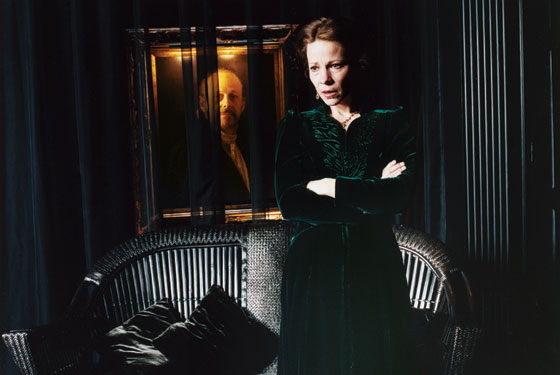
The woman cutting into her skirt steak across the table is famously resistant to typecasting, but in real life she fits a familiar category. Ambitious and independent, she had her first child at age 40. She’s fled the “Sex and the Cityfied” West Village for leafy Cobble Hill with her boyfriend, a writer who is spending the winter teaching in Houston. So she’s currently caring for her 1-year-old daughter alone while working a 60-plus-hour week. She reports being “really happy” and “creatively fulfilled,” but allows that “I’m always running, running, running,” and “what I want is to sit for a minute.”
All right, so Lili Taylor is not some movie-star manqué but a MoMA-card-carrying member of Brooklyn’s haute Boboisie. Unlike certain outer-borough peers, however, she rarely plays one in films. And at the moment, the oft-proclaimed “indie queen” is taking on a monstrous part in Eugene O’Neill’s four-and-a-half-hour 1931 epic Mourning Becomes Electra. Christine Mannon, the matriarch of a powerful family, is based on Clytemnestra in Aeschylus’s Oresteia. Which means she kills her husband just after he returns from the Civil War, torments her daughter, and flirts with her son for her own selfish ends. It’s Lady Macbeth, but with fewer boundaries—the kind of role you’d envision for Helen Mirren, who did the part in 2003 in London. And oddly, it’s perfect for Taylor right now.
Like her boyfriend, Nick Flynn, whose memoir, Another Bullshit Night in Suck City, begins when he runs into his drifter father in a homeless shelter, Taylor has experience with families one might consider “queer” (an adjective repeatedly applied to the Mannons in the play). Her father ran a hardware store in a well-off suburb of Chicago, but he was also a poet and a manic depressive. “I think my dad was a narcissist,” she says. “I told him to his face when he was alive. So yeah,” she says with an ebullient laugh, “I’ve drawn on Dad.”
Taylor, something of a psychology geek, has read extensively from psych texts—including the DSM-IV—to prepare for parts. It’s a habit she’s trying to cut down on; she spent the long rehearsal stretch for Mourning doggedly avoiding books, then gave in and picked up Rites and Myths of Seduction, by Aldo Carotenuto—which she eagerly pulls out of her oversize Flight 001 travel bag. “From this book I got ‘consciously evasive movements,’ ” she notes as an example of the “great actable things” she finds. “If she seduces, I want to know more: What’s seduction about? But,” Taylor insists, “I’m not diagnosing her.”
“She’s an incredibly probing actress. She’s daring and brave, and we work the same way,” says Mourning director Scott Elliott, who is directing Taylor for the third time. “Lili’s a muse for me. And since she’s had a baby, she’s just gotten hotter—so soft and delicious looking.” Elliott pauses. “Not fat!”
Taylor admits to feeling “a little resistant” to the idea of staging screaming death matches with a daughter onstage while coddling her own, Maeve, at home. But her relationship with Jena Malone, the 24-year-old actress playing Lavinia, is warmly maternal. The play’s most striking twist is Lavinia’s transformation from a righteous child in mourning into a captivating sociopath just like Mom. Malone, in her first truly adult role, seems to take the torch from Taylor in more ways than one. The younger actress, something of an indie princess, holds up Taylor as proof that you can “retain your private life and have a family and not live beyond your means, which makes you spoiled in mind and gut.” She calls Taylor “a fucking shining light. Because she exists, I can, too.”
Taylor is a bit more ambivalent about her career. She believes she failed to capitalize on her intense and lauded turn as would-be assassin Valerie Solanas in I Shot Andy Warhol. It was around that time, as she tells it, that indie producers were turning to A-list stars for better studio deals. “I’d like more options, definitely,” Taylor says. “I have aspirations of philosophies I’d like to hold. Like, if there’s just one person in the audience, that’s enough. If someone sees this movie in a thousand years and has a little chord struck, that’s enough.” She chuckles, then stops. “Easier said than done.”
Mourning Becomes Electra
By Eugene O’Neill.
Acorn Theatre. Through April 18.
